
We use Google Cloud Translation Services. Google requires we provide the following disclaimer relating to use of this service:
This service may contain translations powered by Google. Google disclaims all warranties related to the translations, expressed or implied, including any warranties of accuracy, reliability, and any implied warranties of merchantability, fitness for a particular purpose, and noninfringement.

Highlights
- The industry, which started with limited workers, currently has around 1,000 workers and employees, whose products have reached India and third countries for the last five years, especially snacks are being exported to 24 countries including America, Australia, the Middle East, and Taiwan.



The politically conscious city of Biratnagar is also considered to be leading industrially. He was Biratnagar Gulzar with Bela Jute Mill, The Juddha Match Industry, Ashok Textile, Morang Sugar Mill, Ganpati Cotton Mills. The contributions of those industries were significant to keep the economy running at that time.

However, at present, Biratnagar is without old and big industries. The identity of the country's 'industrial city' is gradually disappearing. However, there is no need to despair. A limited number of industries that can be counted on the fingers have preserved the legacy of Biratnagar. Some industrialists and businessmen are active round the clock to prevent the loss of heritage. One of them is Century Spices and Snacks.
This industry started about 25 years ago with the aim of producing spices, now it is producing spices from food items to tea. It has established itself as the country's leading brand of spices, food products and paustick snacks. Biratnagar was a city 50 years ago, but it was not fully urbanized. Malaria and kala-azar were feared. Few dared to venture to Biratnagar.
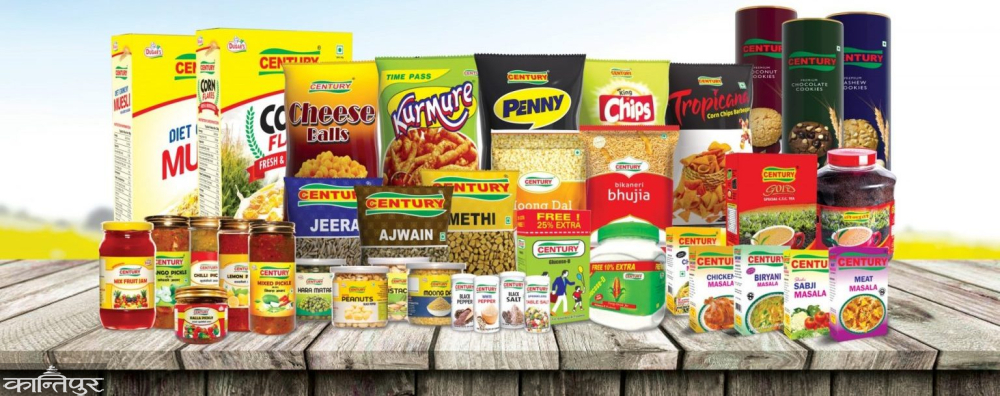 At that time, Harisingh Dugad was already involved in business. Originally he was a grocer. At the same time, he produced and sold new drinks in his own bottle. Old residents remember that the 'home made ginger cola' he prepared was very popular at that time. The demand for drinks made using local produce was widespread at that time. The drink that quenches the thirst of Coca-Cola among Nepali consumers is probably the first domestic drink in Nepal. Harisingh's four brothers were the charioteers of their father's business. All four brothers used to go from village to village to sell 'Ginger Cola' on bicycles.
At that time, Harisingh Dugad was already involved in business. Originally he was a grocer. At the same time, he produced and sold new drinks in his own bottle. Old residents remember that the 'home made ginger cola' he prepared was very popular at that time. The demand for drinks made using local produce was widespread at that time. The drink that quenches the thirst of Coca-Cola among Nepali consumers is probably the first domestic drink in Nepal. Harisingh's four brothers were the charioteers of their father's business. All four brothers used to go from village to village to sell 'Ginger Cola' on bicycles.
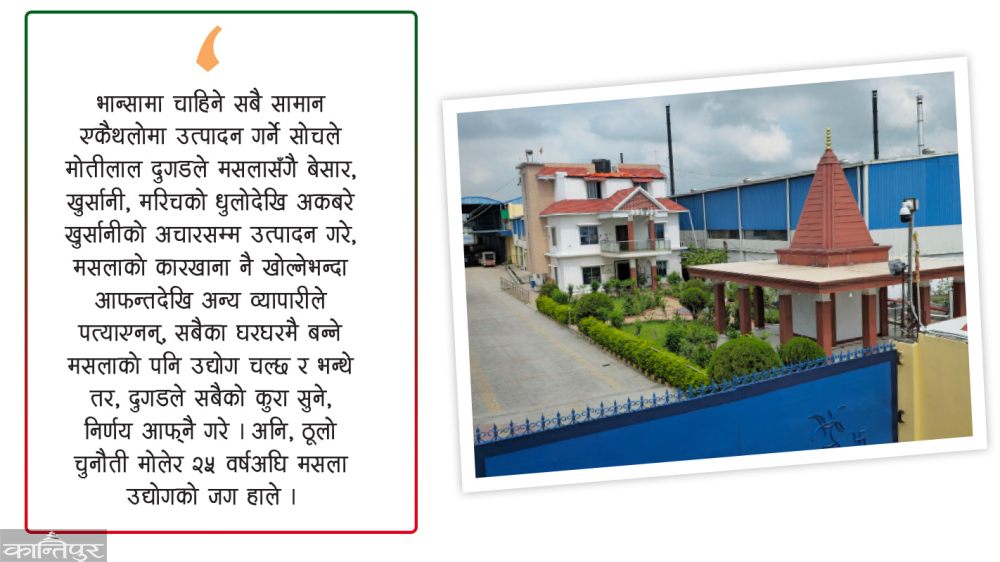
A business company was conceived in the 1980s following the same business path dug by Harisingh. Motilal Dugad's younger son had the idea of producing food products, spices, confectionery, fruits and vegetables in one place from that company.
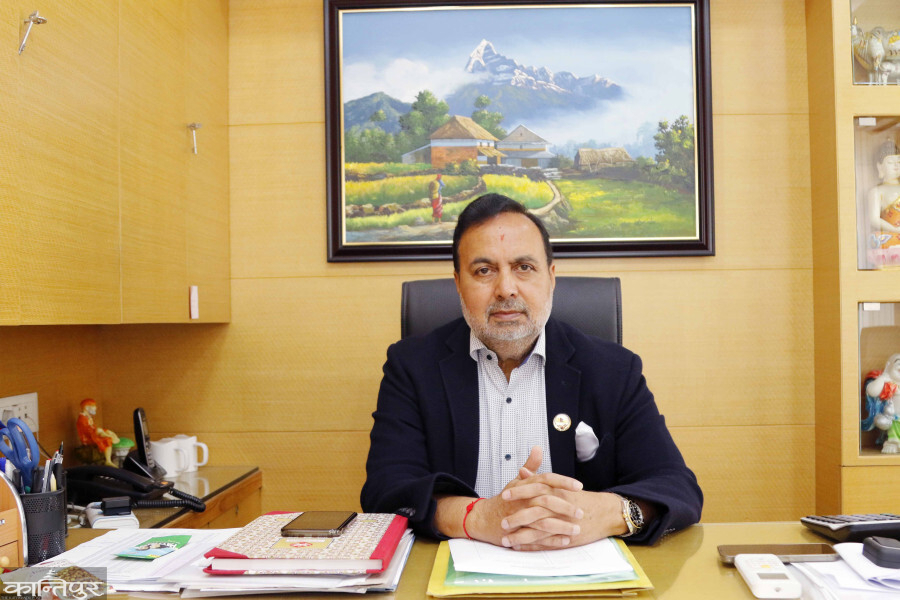 Motilal Dugad
Motilal Dugad
Motilal eventually launched the Dugad Spices and Food brand in 1999. Started under the same brand, the production of Century Masala. Moti was harassed by his relatives and other traders when he was about to open a spice factory. Is the spice industry made in everyone's house sold? Everyone had a common question. However, Motilal listened to everyone, pondered, and made a decision himself. He laid the foundation of the spice industry by accepting a big challenge. The visionary Moti was confident that spices could also be made into a premium brand.
When the production of century spices started, there was no spice industry anywhere in Nepal. Spices are also sold in Nepal! Not only did he work to break the mood of the common people, but he succeeded in establishing the Century brand within a short time of establishment. When Century Spices became popular in the market, other traders were attracted to it. Finally, thinking that spice trade would be profitable, it started learning this trade from other parts of the country. "The industry freed the common consumer from the hassle of buying spices," said Gaurav Dugad, director of the company. On the occasion of Silver Jubilee, the company is preparing to bring more new products.
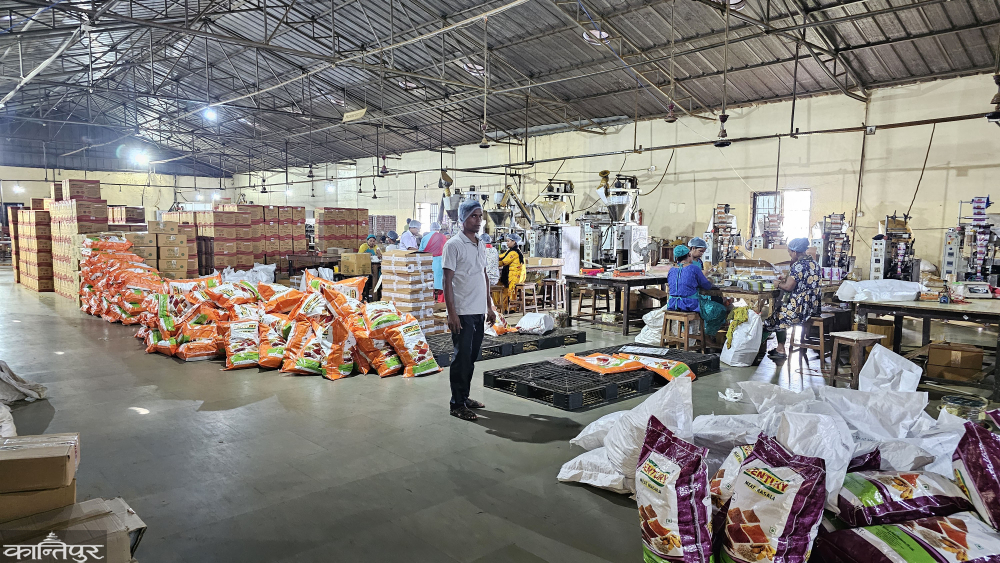 Founder Motilal's idea was to produce all the kitchen essentials in one place. Needless to say, he produced not only spices, but from turmeric to chili powder. "It was my uncle's dream that all the items needed in the kitchen should be from Century," said Gaurav, "now that dream has almost come true." In the future, the company is planning to increase the production of other items that are in short supply in the kitchen. Another plant is under construction at Duhabi in Sunsari for the new product, within 28 kattas of land.
Founder Motilal's idea was to produce all the kitchen essentials in one place. Needless to say, he produced not only spices, but from turmeric to chili powder. "It was my uncle's dream that all the items needed in the kitchen should be from Century," said Gaurav, "now that dream has almost come true." In the future, the company is planning to increase the production of other items that are in short supply in the kitchen. Another plant is under construction at Duhabi in Sunsari for the new product, within 28 kattas of land.
Initially, when the industry started from a small and narrow room in the middle of Biratnagar, only spices were produced. Now there is a grand industry spread over an area of about one and a half bigha in Tankisinbari of Sunsari-Morang industrial corridor. Along with the expansion of the industry, the production has also expanded. Not just spices, nowadays everything from chili powder to Akbare chilli pickles, and from cornflakes to potato chips is produced from the same bag. The same quality as in the past is still constant. We want to give quality to consumers, not just to make money,' said Gaurav.
During the 25-year journey, dozens of food items such as spices, snacks, energy drinks, satu and others have been produced by Century brand. Along with it is Radisson Hotel as hospitality. It is one of the classy and expensive hotels in Biratnagar. A new star hotel with a casino, a wingwaite and a mall are also being prepared for operation soon. "Our future plan is to provide all services from one place," said Gaurav, "This is our dream project. It is our claim that there is no such project in Nepal.'
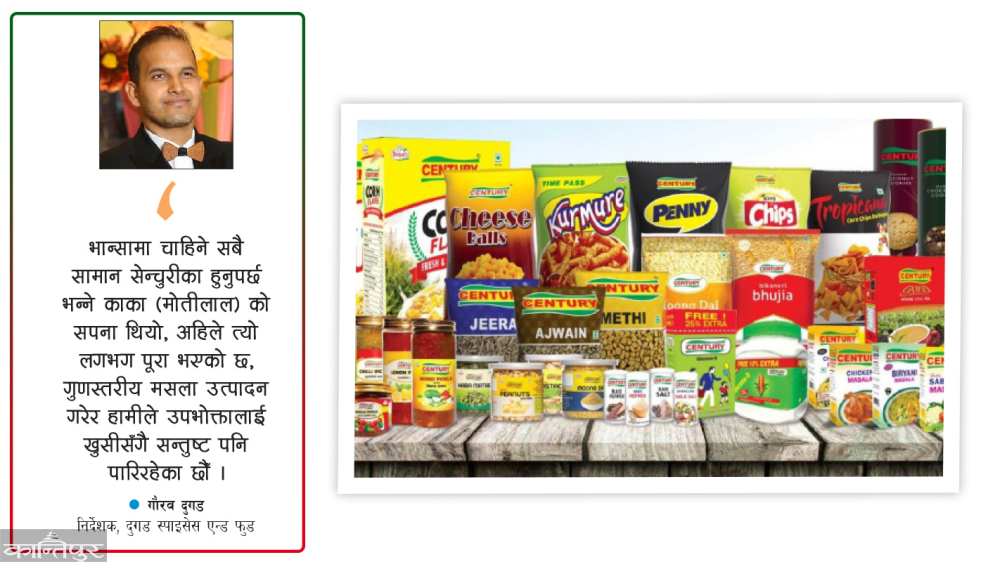 The industry which started with limited workers now has around 1000 workers/employees. There are 500 workers in the factory. 120 supervisors are working in the company. Century's products have been exported to India and third countries for the last 5 years.
The industry which started with limited workers now has around 1000 workers/employees. There are 500 workers in the factory. 120 supervisors are working in the company. Century's products have been exported to India and third countries for the last 5 years.
especially snacks are being exported to 24 countries including America, Australia, Middle East, Taiwan. "Foreigners are eating our products without any taste", Gaurav said, "We have not made any compromise on quality products." The message that quality products are produced in Nepal is being established in the world. There is no special demand for
spice in Europe and America. There is more use and demand for spices in countries like Nepal, India, Bangladesh and Sri Lanka in the South Asian region. Spices used in food in third countries are different from here. As a result, there is no demand for Nepali products. The main raw material of the spice comes from India. Some items are also imported from across the sea. As the pepper is imported from Vietnam. Palm oil comes from Malaysia, cinnamon from Sri Lanka and turmeric from Gujarat, India. Nepali products are used like tejpat, cinnamon, ginger etc. "The production of spices in Nepal is not enough", Gaurav lamented, "That's why we are forced to import spices from India and third countries and send them to the market."
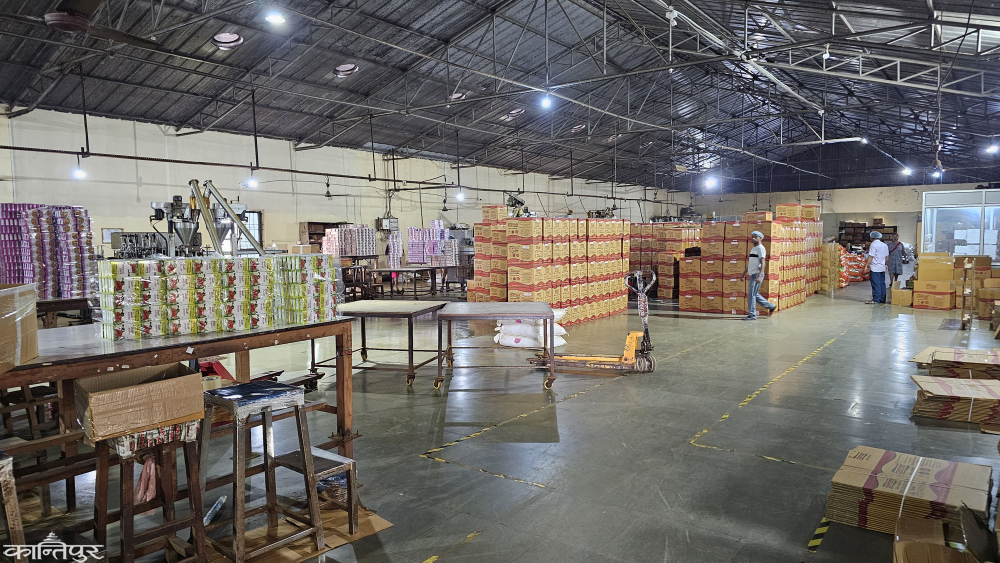 Lately, research and study has been intensified to find out how Nepali spices can be exported to third countries. The company is actively looking for possible ways to export spices and bring in foreign currency. "If spices can be sent to third countries, more jobs could be created in the country," Gaurav said, "which would reduce the migration of young people to foreign countries, even if it is a small amount."
Lately, research and study has been intensified to find out how Nepali spices can be exported to third countries. The company is actively looking for possible ways to export spices and bring in foreign currency. "If spices can be sent to third countries, more jobs could be created in the country," Gaurav said, "which would reduce the migration of young people to foreign countries, even if it is a small amount."
Century, which has an annual turnover of more than 2 billion 700 million, is sending its products to America as the third country. The demand for Century snacks is also high in the Gulf countries of the Middle East. This year, the company has a target of trading around 3.5 billion. Director of Industry Gaurav said, 'Our aim is not only to earn financial income by doing business, but also to satisfy our valuable customers.'
 प्रकाशित : भाद्र ९, २०८१ १०:३२
प्रकाशित : भाद्र ९, २०८१ १०:३२

 २२.१२°C काठमाडौं
२२.१२°C काठमाडौं











